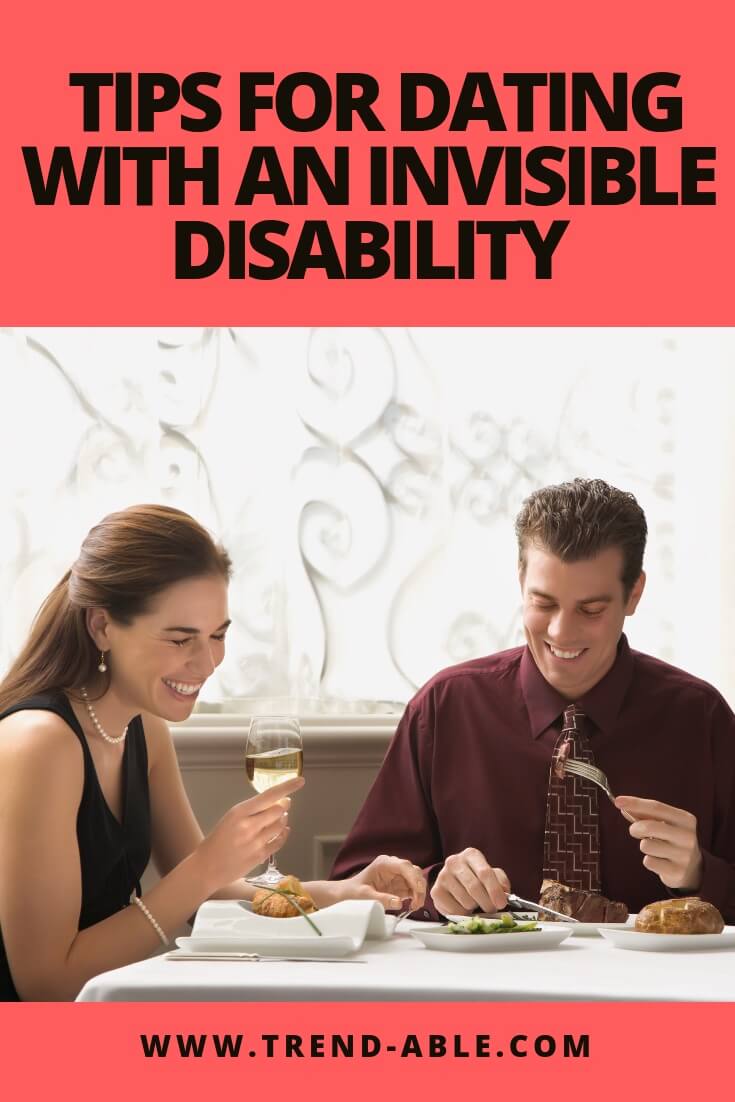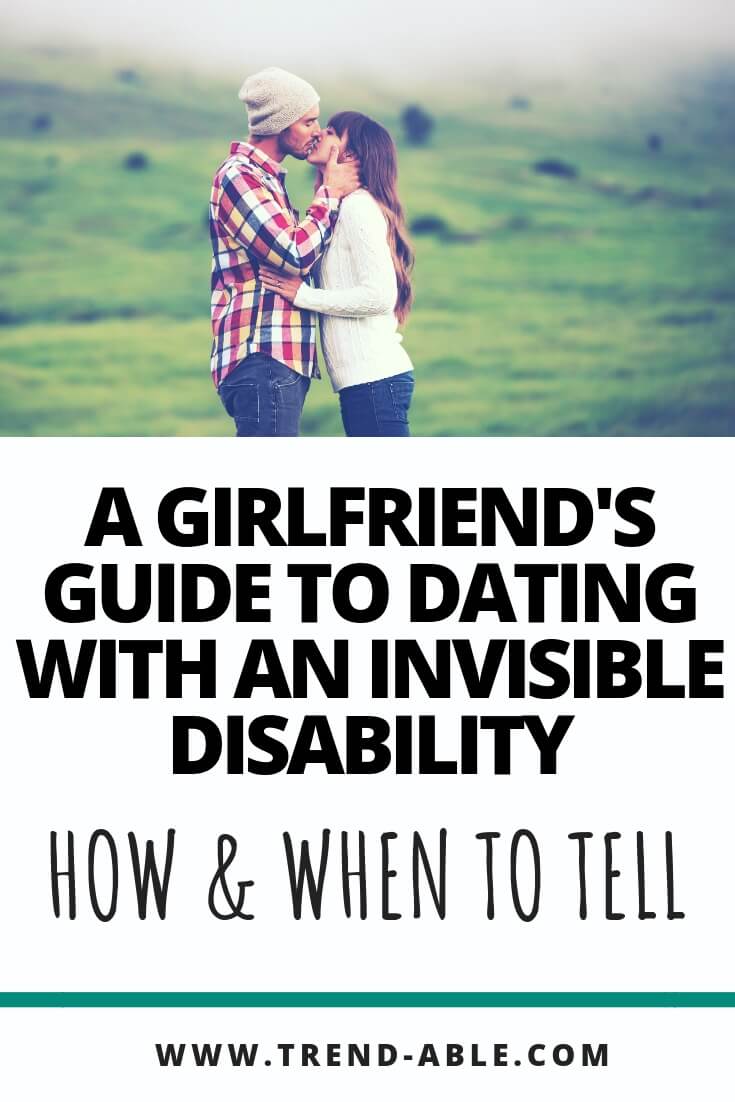Dating sucks. It sucked in the long ago landline days before the Internet, Match.com, and Tinder. And it sucks now.
Dating is a teeter-totter of emotions. One minute you are feeling up, energized, full of hope, anticipation, and excitement. The next minute you are crashing down to the ground feeling hopeless, confused, and paranoid about the Whys? and What If’s?
I will be alone forever. Maybe he doesn’t want kids? But, we had a connection. Didn’t we?
Women with an invisible physical disability have additional dating woes. We think about when & how to reveal our disability to a potential partner and if it will matter when we do.

When I got married in 1997, I thought, as most new brides do, that it would last forever. I had known my former husband since college. The fact that I had a progressive neuromuscular disorder was never a factor in our relationship nor its eventual demise. He was supportive when I got my first pair of leg braces (AFO’s). He was patient and helpful when I needed his arm for balance. He was (and still is) a great guy.
Ten years, two kids, and several wrinkles later, I re-entered the dating world. It was exciting, scary, disappointing, depressing, and even comical at times. The 60-year-old Harley Driver who lied and said he was 45 and the supposed “venture capitalist” with a gambling problem who still lived with his parents were just a few of my SNL skit-worthy dating experiences.
It’s doubtful these guys would have made good partners for any woman but definitely not one with an invisible disability. After a year of full-time dating hell, I somehow managed to snag and marry the man of my dreams.
Here are some of my best tips for dating with an invisible disability:
1. Be Real, Not Revealing
If you’re online dating, don’t post the fabulous photo of you from 10 years ago or say you love watching sports when you really don’t. Your profile sets the tone for a potential relationship based on honesty and truth with oneself. Post current (no selfies or swimsuits) casual pictures and highlight your actual interests.
There are no rules for when to tell someone you have an invisible physical disability. Let’s pretend for a second that you are randomly asked to write a description of yourself using 15 words or less. Do you mention your invisible disability? If not, then like me, it is not your lead and not something you need to tell someone about before or during a 1st or 2nd date.
2. Be Proactive, Not Reactive
You have been texting and emailing with someone with potential, and he suggests meeting in person for a date. When you have physical challenges, the small details can negatively affect your comfort level and experience. Having to keep your balance while standing in a crowded, overbooked restaurant or going to his favorite sushi restaurant and needing a fork because you can’t use chopsticks are things that can throw us off our game.
You can avoid the unexpected (mostly) by having a few favorite “go to” places to suggest.
In my experience, most men are happy not to have to do the planning and will meet you wherever you want.
3. KEEP IT SIMPLE & SWEET
When couples who are newly dating see a potential future with one another, their conversations naturally become deeper and more intimate. I only told two of the men I dated details about my neuromuscular disorder. I didn’t see a point of going into it when I wasn’t certain he or I even wanted to see each other again.
Try not to stress about the right time to tell him you have a physical disability. It will most likely come up as part of natural conversation. Like, “Do you mind tearing my sugar packet? I have trouble with my hands.” Try keeping the explanation to a minimum and using humor. No date (or anyone, period) wants a lesson in genetics or the epidemiology of your disorder.
4. Don’t Assume & Never Settle
Dating is a leap of faith for everyone. In order to eventually meet someone great, you have to jump (or walk slowly) in the game.
None of us come with warning labels or a set of instructions. Some people will like you and some people won’t, regardless of your disability. Try not to be self-critical or make assumptions.
Confidence is the sexiest thing you can wear. So work it. Don’t settle for anyone who doesn’t make you feel like the beautiful woman you are.






Love football pub tv
Good read as always, Lainie! I met a wonderful man after I divorced. We were friends before we started dating. He doesn’t care about my disability or the AFO. He sees beyond the superficial . Lucky me!
Lucky you is right! Who wouldn’t want to be with you?
Thanks Lainie for the article. I completely agree! I have been in these situations and its hard to find the right time. I usually don’t (don’t tell my doctor) wear my AFO’s, but the guy will usually say something like oh did you hurt your foot. This is usually when I go ahead and tell them.
I know I should always wear my AFO’s but I don’t mainly b/c I’m afraid I will lose the little strength I have. Bonnie’s attitude is awesome!
Hi Dee Dee, thanks friend for your comment & for getting it!
Thank you Lannie for your encouragement!!Loved the part about online dating., Very helpful! I wear my AFOs with pride that I can have them! Without them, I cannot stand or walk! They are a great invention and keep me functioning!
Hi Bonnie,
Thanks so much for reading & taking the time to leave a comment. I love your attitude about the afos.
I enjoyed your article on dating with a disability. I’ve been in CROW Boots for 6 years. I’ve not always enjoyed wearing them, but I’ve learned to respect and to be grateful for them. Since May, 2019 I’ve been in one surgical boot and one CROW Boot after arch removal on the left boot. The goal is to be able to wear shoes again. In training to learn once again to walk with rollator. Dating again….working on keeping an open mind. Shoes, boots or a combination of either and a rollator. Whatever works. Hoping one day to find that special someone who will love me for who I am, and not for what I have. There’s such a difference in the two.
Hi Cathy,
It’s sounds like you have a very positive mindset & that’s really the way to find that person ?
This is a very AWESOME article! I have a teen son who is high functioning Autistic and this is really good information.
Thanks so much for taking the time to comment Nikole.
All so true! Great article!